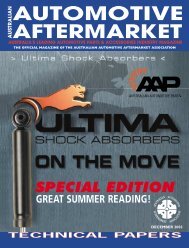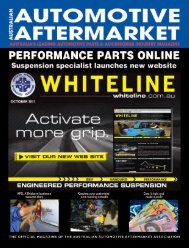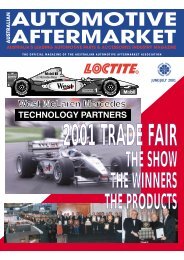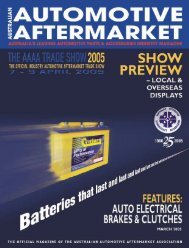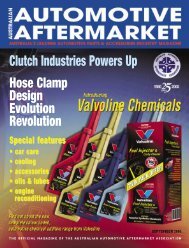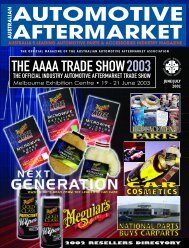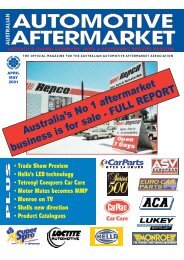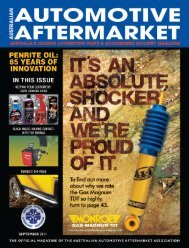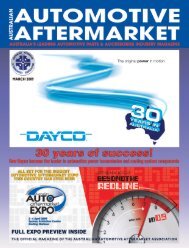AM MAGAZINE SHELL - Australian Automotive Aftermarket Magazine
AM MAGAZINE SHELL - Australian Automotive Aftermarket Magazine
AM MAGAZINE SHELL - Australian Automotive Aftermarket Magazine
You also want an ePaper? Increase the reach of your titles
YUMPU automatically turns print PDFs into web optimized ePapers that Google loves.
NEWS<br />
HEAT RANGE TESTING OF SPARK PLUGS<br />
If you ever wondered how spark plugs are tested to make sure they will continue to perform in harsh environments, here’s<br />
some insight into how testing is conducted for the <strong>Australian</strong> and New Zealand markets.<br />
When an engine is operating the spark plug<br />
is heated by the combustion process.<br />
Some of the heat that is absorbed by the<br />
spark plug is transferred to the incoming air<br />
fuel mixture, however most of the heat is<br />
conducted to the cylinder head.<br />
The working environment<br />
There is a delicate balance between the<br />
heat absorption and heat dissipation, with the<br />
aim to get the insulator temperature to reach<br />
the self cleaning temperature of about 500°C.<br />
If the temperature drops below this level<br />
there is a danger that soot and oil from<br />
incomplete combustion will settle on the colder<br />
areas of the spark plug.<br />
This can form a shunting of the spark and<br />
result in misfiring. Conversely if the insulator<br />
temperature is too high (above 900°C) there<br />
will be a dramatic increase in electrode wear<br />
due to oxidation and hot gas erosion, or even<br />
worse, destructive pre-ignition.<br />
How is the heat range of a<br />
spark plug tested?<br />
Robert Bosch Australia carries out regular<br />
heat range testing of vehicles in the <strong>Australian</strong><br />
and New Zealand car parcs.<br />
This ensures the heat range listed in its<br />
catalogues is correct for the region.<br />
STOPPING THE INDUSTRY FOR 40 YEARS<br />
Since its humble beginning in 1968 selling brakes and clutches to local trade workshops, Superstop has grown to<br />
become one of the largest independent brake and clutch resellers in Victoria.<br />
So what’s its secret? From its first ever<br />
advertisement in The Free Press in 1979<br />
Superstop has always valued the importance<br />
of advertising.<br />
“Keeping our customers up to date with<br />
the latest products and world leading brands<br />
helps them run a professional business and<br />
helps us to stay ahead of our competitors,”<br />
Superstop Director, Steve Kreti, explained.<br />
Testing is carried out on local vehicles using<br />
local fuels to replicate the driving conditions in<br />
the region.<br />
To do this Bosch uses a large chassis<br />
dynometer at its site in Clayton, Melbourne to<br />
produce the required vehicle loads.<br />
Firstly, for every given vehicle the hottest<br />
cylinder in the engine is found.<br />
This is done using a special spark plug<br />
equipped with a thermocouple that allows<br />
Bosch to directly measure cylinder<br />
temperature.<br />
The hottest cylinder is found because it is<br />
the weak link.<br />
It is the one that will suffer from pre-ignition<br />
at elevated combustion temperatures before<br />
the other cylinder.<br />
It is for this reason the heat range testing is<br />
conducted in this cylinder.<br />
Ionic Current Measurement<br />
The Bosch Ionic Current measurement<br />
procedure uses combustion characteristics to<br />
determine the engine’s heat range<br />
requirements.<br />
The ionizing effect of the flames is used to<br />
determine how combustion develops over time.<br />
This is done by measuring the conductivity of<br />
the spark gap.<br />
Characteristic changes in combustion<br />
Another secret to the success of<br />
Superstop has been its staff.<br />
Mick Cree started with Superstop in 1975<br />
as an eager 21-year-old mechanic.<br />
Thirty-four years later Mr Cree, who<br />
manages the Mont Albert store, admits he<br />
has seen many changes since he first started<br />
as a young man with Superstop.<br />
“In the late ‘70s and early ‘80s Superstop<br />
used to re-bond its own brake shoes and<br />
remanufacture its own clutches,” he said.<br />
“Technology has changed and so have we,<br />
but one thing remains the same - good old<br />
fashion service backed with up to date expert<br />
advice.”<br />
Mr Kreti said Superstop has continued its<br />
winning formula by opening its second store<br />
in South Yarra, Melbourne.<br />
“Distributing some of the world’s best<br />
brands such as Mintex, Pagid, LUK, Exedy<br />
and Boge shock absorbers has really<br />
Bosch spark plugs undergoing heat range testing.<br />
process due to increased thermal loading can<br />
be detected using ionic current and is used in<br />
the assessment of the auto ignition process.<br />
In this way Bosch can make adaptions in<br />
the plug design to prevent thermal ignition from<br />
occurring.<br />
So, when you purchase a Bosch Spark plug<br />
you can be assured that there is an intensive<br />
testing program behind the application found<br />
in the Bosch spark plug recommendation in its<br />
catalogue.<br />
For more information on Bosch spark plugs, or<br />
for a copy of the Bosch spark plug catalogue,<br />
contact your local Bosch representative or call<br />
Bosch Customer Service on 1300 30 70 40.<br />
separated us from our competitors,” Mr Kreti<br />
said.<br />
“Quality is no exception and we will not<br />
put our name behind a product if it’s not the<br />
best.”<br />
Superstop: proudly stopping the industry<br />
for more than 40 years.<br />
Contact Superstop Brake & Cultch on<br />
03 9890 1924<br />
6 AU T O M O T I V E A F T E R M A R K E T M AG A Z I N E D E C E M B E R 2 0 0 9 www.aaaa.com.au



